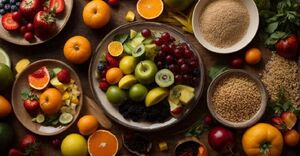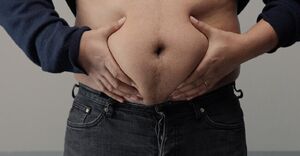
Hydrate to Lose Weight: The Role of Water in Your Weight Loss Journey
.jpg)
Are you struggling to shed those extra pounds? One simple yet often overlooked solution may lie in the most basic of beverages – water.
We will explore the crucial role that water plays in weight loss. From how water aids in burning calories to the connection between dehydration and weight gain, we will delve into the importance of staying hydrated for a successful weight loss journey.
Stay tuned for practical tips on incorporating more water into your diet and staying hydrated during exercise. Let’s hydrate our way to a healthier, slimmer you!
Why is Water Important for Weight Loss?
In the weight loss journey, water plays a crucial role in the body’s health and metabolism. Proper hydration is essential for effective weight loss and overall well-being.
Water is not only a vital component of the body but also supports various metabolic functions that are essential for weight loss. Staying well-hydrated aids in digestion, nutrient absorption, and the elimination of waste products.
When you maintain proper hydration levels, your body can efficiently metabolize stored fat, leading to weight loss. Water helps regulate body temperature, lubricate joints, and support the transportation of nutrients throughout the body, all of which contribute to overall health and well-being.
Therefore, it’s crucial to prioritize hydration in your weight loss journey to optimize your body’s functions and reach your goals.
How Does Water Help with Weight Loss?
Water aids in weight loss by hydrating the body, promoting the breakdown of body fat, providing energy to cells, aiding digestion, flushing out toxins, controlling appetite, and boosting metabolism.
When the body is properly hydrated, it functions more efficiently, allowing cells to metabolize fat more effectively, resulting in weight loss. Adequate hydration also plays a crucial role in supporting cellular function, ensuring that processes such as nutrient absorption and waste removal occur smoothly.
Staying hydrated helps maintain optimal energy levels, keeping fatigue at bay and supporting physical activity that contributes to weight management. Water’s ability to flush toxins aids the body in eliminating harmful substances, while its role in appetite control helps prevent overeating. By boosting metabolism, water helps the body burn calories more efficiently, further supporting weight loss efforts.
How Much Water Should You Drink for Weight Loss?
Determining the optimal water intake for weight loss involves considering various factors such as fitness levels, dietary habits, overall wellness goals, and the need for proper hydration.
One of the key benefits of consuming an adequate amount of water is its ability to support weight loss efforts. Staying well-hydrated can help enhance metabolism and curb appetite, making it easier to maintain a calorie deficit. For those engaging in regular fitness routines, ensuring sufficient liquid intake is crucial for performance and recovery. Whether you prefer plain water, infused options, or herbal teas, prioritizing hydration can contribute significantly to your overall wellness objectives. Monitoring and adjusting your water intake based on your individual needs and lifestyle can play a vital role in achieving your weight loss goals.
The Connection Between Dehydration and Weight Gain
Dehydration can lead to water retention, bloating, and weight gain as the body’s hydration status impacts its ability to regulate fluid balance and metabolic processes.
When the body is dehydrated, it goes into survival mode, holding onto water as a defense mechanism. This water retention not only causes visible bloating but also disrupts the body’s natural ability to flush out toxins and waste.
As a result, metabolic functions can be compromised, leading to a sluggish metabolism and difficulty in burning calories efficiently. Therefore, maintaining proper hydration levels is crucial for supporting optimal metabolic processes and preventing the undesired effects of bloating and weight gain.
How to Incorporate More Water in Your Diet for Weight Loss?
Achieving adequate hydration for weight loss involves implementing strategies to increase water consumption, reaping the benefits of improved hydration while maintaining a balanced diet and water equilibrium.
- One effective tip to boost water intake is to carry a reusable water bottle with you throughout the day, making it convenient to sip on water regularly.
- Incorporating hydrating foods like fruits and vegetables into your meals can contribute to your overall fluid intake.
- Keeping track of your water consumption through apps or setting reminders can help you stay on top of your hydration levels.
Remember, proper hydration not only aids in weight loss but also supports digestion, metabolism, and overall energy levels in your body.
Drink Water Before Meals
Drinking water before meals can aid in appetite control, support weight management efforts, promote sustainable lifestyle habits, and contribute to overall health and well-being.
It acts as a natural appetite suppressant by filling up the stomach, which can lead to consuming fewer calories during the meal. This simple practice helps in preventing overeating and promotes mindful eating habits. Staying hydrated can boost metabolism and improve digestion, further benefiting weight management goals. By incorporating this habit into your daily routine, you not only support your body’s natural ability to regulate weight but also foster a holistic approach to wellness that aligns with sustainable living principles.
Replace Sugary Drinks with Water
Replacing sugary drinks with water, including options like hot water with lemon, is a valuable weight loss tip that provides hydration benefits and supports overall well-being.
Making this simple switch can not only help in reducing daily calorie intake but also contribute to increasing metabolism and aiding digestion. Hot water with lemon, for instance, is not only refreshing but also adds vitamin C to your diet, boosting immunity. Staying hydrated by opting for water over sugary beverages can enhance energy levels and promote clearer skin. By prioritizing hydration through these healthier alternatives, individuals can experience sustainable weight management benefits while reaping numerous other health advantages.
Infuse Your Water with Fruits and Herbs
Infusing water with fruits and herbs can enhance its nutritional value, elevate hydration levels, support weight loss efforts, and increase overall water intake for improved health.
By infusing water with fresh fruits like lemon, berries, or oranges, you not only create a refreshing beverage but also add essential vitamins and antioxidants.
Herbs such as mint or basil not only lend a delightful flavor to the water but also offer additional nutritional benefits.
This practice can be a convenient way to meet your daily water intake needs, especially for those who struggle to drink plain water.
The infusion process also encourages people to consume more water throughout the day, which is crucial for maintaining optimal hydration levels and supporting overall well-being.
Eat Water-Rich Foods
Including water-rich foods in your diet can provide essential hydration, support cellular functions, boost energy levels, aid in digestion, and contribute to weight reduction goals.
These foods, such as cucumbers, oranges, and watermelon, are not only hydrating but also packed with essential nutrients like vitamins, minerals, and antioxidants.
By incorporating them into your meals, you can improve overall well-being and enhance your body’s natural processes.
Due to their high water content, these foods help keep your cells hydrated, promoting optimal function and energy production.
Their low-calorie and high fiber content make them excellent choices for weight management, helping you feel full and satisfied while supporting your weight reduction efforts.
Hydration and Exercise: How Much Water Do You Need?
Determining the appropriate water intake during exercise involves considering factors like hydration needs, physical activity levels, water balance, and the potential benefits of increased metabolism in supporting workout performance.
Physical activity level plays a crucial role in determining the amount of water one should consume during exercise. For mild activities, such as walking or yoga, regular sipping of water may suffice. For more intense workouts like running or weightlifting, individuals may need to increase their water intake to stay adequately hydrated. Maintaining equilibrium in water balance is essential to avoid dehydration and optimize performance. Proper hydration not only supports physical stamina but also helps increase metabolism, facilitating better energy utilization and overall workout efficiency.
The Role of Electrolytes in Hydration and Weight Loss
Electrolytes play a vital role in hydration by facilitating fluid balance within cells, providing energy for bodily functions, and aiding in the digestion process, all of which are essential for effective weight loss.
By maintaining the proper balance of electrolytes in the body, it helps ensure that cells are adequately hydrated, allowing them to function optimally. This cellular hydration is crucial for maintaining overall health and supporting various physiological processes.
Electrolytes also play a key role in providing energy to the body, which is essential for fueling daily activities and exercise. These essential minerals aid in supporting digestion by helping regulate fluid levels in the gut, promoting efficient nutrient absorption.
Incorporating electrolyte-rich foods and beverages into your diet is vital for staying hydrated, energized, and maintaining optimal health.
Tips for Staying Hydrated and Losing Weight
Implementing effective hydration strategies, monitoring water consumption, understanding the benefits of hydration for weight loss, and maintaining a balanced diet are key components for staying hydrated and achieving weight loss goals.
To maintain optimal hydration levels and support weight loss, it is essential to prioritize water intake throughout the day. One practical tip is to carry a reusable water bottle wherever you go, ensuring easy access to water at all times. Setting specific goals for daily water consumption can help track progress and ensure consistency. Combining hydration efforts with a diet rich in fruits, vegetables, and lean proteins can further support overall health and weight management.
Carry a Water Bottle with You
Carrying a water bottle with you is a simple yet effective way to stay hydrated, support the weight loss process, maintain a healthy body composition, and integrate hydration seamlessly into your lifestyle.
Hydration plays a crucial role in weight loss, as water aids in digestion, metabolism, and the elimination of toxins. By having a bottle of water at hand, you can easily sip throughout the day, keeping your energy levels up and cravings at bay. Staying hydrated can enhance your overall performance, both mentally and physically.
This habit not only contributes to weight management but also promotes glowing skin, healthy joint function, and improved cognitive function. Make hydration a priority and notice the positive impact it has on your health and daily activities.
Set Reminders to Drink Water
Setting reminders to drink water can help you maintain optimal hydration levels, shed water weight, reap the health benefits of proper hydration, and enhance fat loss through effective hydration practices.
Consistent hydration is key to supporting various bodily functions such as digestion, nutrient absorption, and temperature regulation. Proper hydration can also enhance cognitive function, mood, and overall physical performance.
By setting reminders to drink water throughout the day, you are more likely to stay on track with your hydration goals, leading to improved energy levels and better skin health. Staying hydrated can help reduce bloating and promote a sense of fullness, which can support weight management efforts.
Track Your Water Intake
Tracking your water intake is essential for meeting weight loss goals, understanding your hydration needs, and supporting weight reduction efforts through proper hydration management.
By monitoring how much water you consume daily, you can gain insight into your specific hydration requirements, as each person’s needs vary based on factors like age, activity level, and climate.
Adequate hydration plays a crucial role in weight loss, as staying well-hydrated can boost metabolism and promote proper digestion, leading to more effective calorie burning.
Effectively managing your hydration levels can also prevent overeating, as thirst can often be mistaken for hunger, resulting in unnecessary calorie consumption that hinders your weight reduction progress.
Listen to Your Body’s Thirst Signals
Paying attention to your body’s thirst signals is crucial for maintaining optimal hydration levels, supporting energy levels, aiding digestion, and ensuring overall well-being based on your body’s hydration status.
When you respond promptly to your body’s cues for thirst, you are essentially supporting your energy levels by ensuring that your body is adequately hydrated. Energy production in your cells relies heavily on a balanced hydration level, with even slight dehydration potentially leading to a noticeable drop in energy. Proper hydration aids digestion by facilitating the smooth movement of food through the digestive tract and supporting the absorption of nutrients.
Your holistic wellness is intricately tied to how well you maintain your body’s hydration state, impacting everything from cognitive function to physical performance.




No Comments